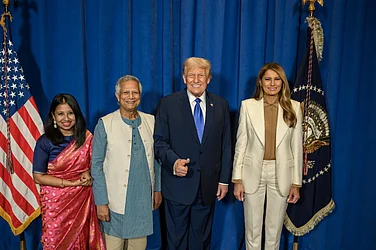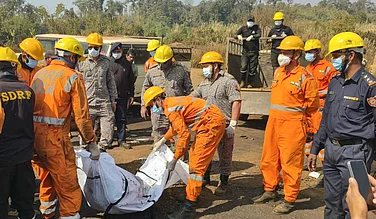South Africa on Friday approached the International Court of Justice, accusing Israel of engaging in “genocidal acts” amid Israel’s ongoing war on Gaza. The significant move from the African nation comes as more than 21,000 people have been killed and over 56,000 injured since the war started on October 7.
South Africa alleged Israel was in breach of its obligations under the 1948 Genocide Convention. In a post shared on X, The Presidency of South Africa said, “South Africa is gravely concerned with the plight of civilians caught in the present Israeli attacks on the Gaza Strip due to the indiscriminate use of force and forcible removal of inhabitants.”
Israel’s foreign ministry refuted allegations. “Israel rejects with disgust the blood libel spread by South Africa,” the foreign ministry said in a statement.
Why has South Africa filed a case at ICJ?
South Africa has consistently shown support for Palestine, denouncing Israel's actions since the beginning of the conflict. In October, President Cyril Ramaphosa publicly declared solidarity with Palestine, holding a Palestinian flag and donning a keffiyeh. He stated, "All of us standing here pledge our solidarity with the people of Palestine."
There has also been a vote in the parliament in favour of closing the Israeli embassy and withdrawing diplomatic staff from Israel.
Apart from government leaders, thousands of citizens have expressed their support and taken to streets in nationwide protests, advocating for a ceasefire.
The foundation of South Africa's support for Palestine lies in a shared history of discrimination and disempowerment. Similar to Palestine, South Africa has grappled with struggles against colonialism and apartheid.
In the past, historical figures such as Mahatma Gandhi and Nelson Mandela have championed the Palestinian cause. The ruling African National Congress (ANC) maintains enduring ties with the Palestine Liberation Organization (PLO), signifying a historic bond between the liberation struggles of Black South Africans and Palestinians.
What is ICJ and what power does it hold?
The International Court of Justice, part of the United Nations, serves two main purposes: resolving legal disputes between countries based on international law and providing legal advice when requested by authorised UN organs or agencies.
The ICC can prosecute serious international crimes like genocide, crimes against humanity, war crimes, and aggression. It can detain individuals in The Hague during trials and, if convicted, they may serve their sentences in countries that agreed to enforce ICC judgments.
The ICJ on Friday acknowledged the receipt of South Africa’s application instituting proceedings against Israel.
“South Africa today filed an application instituting proceedings against Israel before the International Court of Justice…concerning alleged violations by Israel of its obligations under the Convention on the Prevention and Punishment of the Crime of Genocide (the ‘Genocide Convention’) in relation to Palestinians in the Gaza Strip” ICJ said in a press release.
“According to the Application, ‘acts and omissions by Israel . . . are genocidal in character, as
they are committed with the requisite specific intent . . . to destroy Palestinians in Gaza as a part of the broader Palestinian national, racial and ethnical group’ and that “the conduct of Israel — through its State organs, State agents, and other persons and entities acting on its instructions or under its direction, control or influence — in relation to Palestinians in Gaza, is in violation of its obligations under the Genocide Convention,” the press release read.
The legal process at the ICJ could typically take years before a final ruling is issued. However, South Africa has urgently requested the court to take interim action, specifically calling for a ceasefire while the case is being deliberated.


























